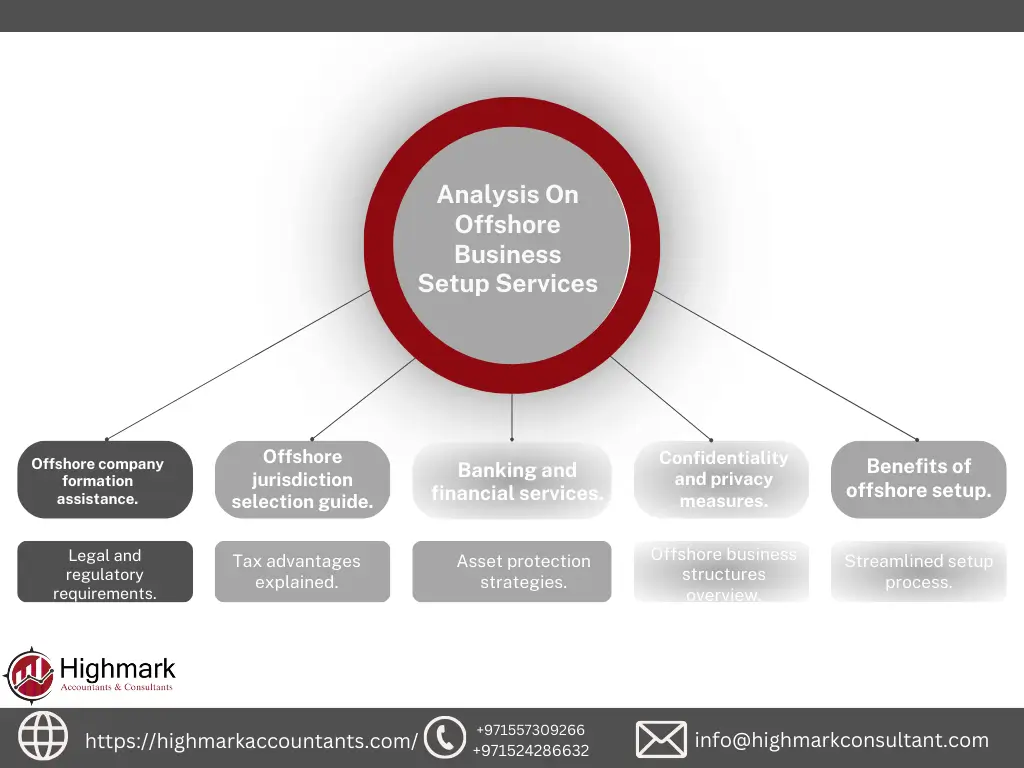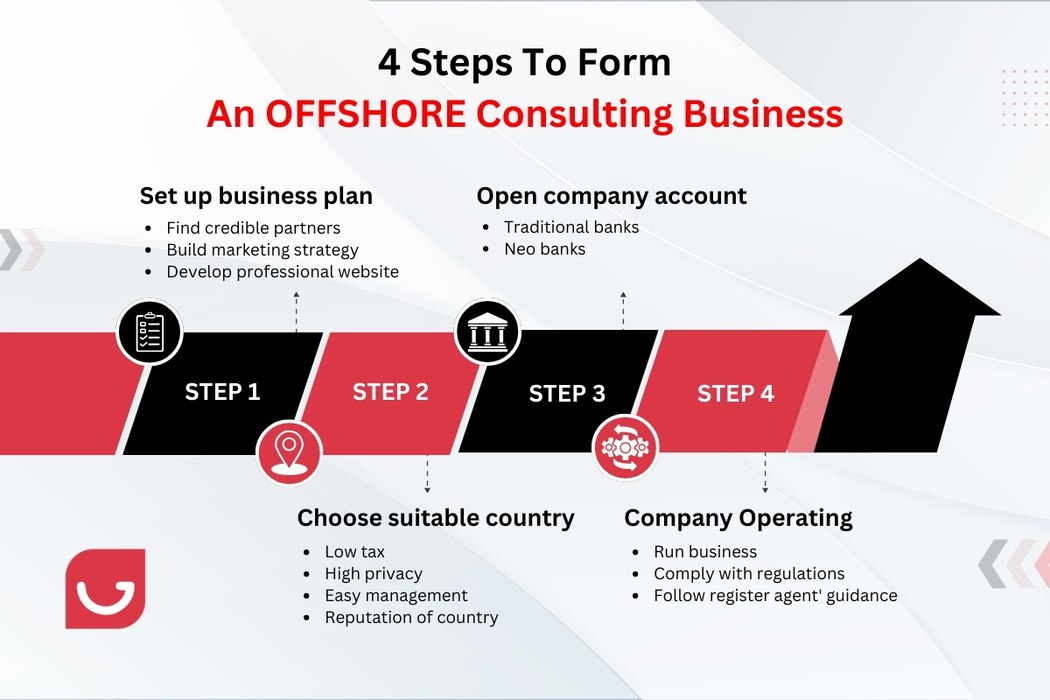How Offshore Company Formations Help Safeguard Assets in High-Risk Regions
Wiki Article
Debunking Offshore Company Formations: How They Run and What to Expect
Offshore firm formations can seem complex and enigmatic. Offshore Company Formations. These entities, commonly developed for tax advantages and personal privacy, operate under one-of-a-kind legal structures. Entrepreneurs might locate themselves navigating via a maze of guidelines and compliance demands. Recognizing the complexities is necessary for success. What are the real advantages? What are the possible mistakes? A closer assessment discloses the nuances that might affect decision-making substantiallyComprehending Offshore Business: Types and meanings
Offshore business are entities established in a jurisdiction outside of a person's or organization's key country of residence, commonly for objectives related to tax optimization, possession security, or governing advantages. These business can take numerous kinds, consisting of minimal obligation firms (LLCs), international business companies (IBCs), and offshore counts on. Each type serves certain features and attract various demands.Minimal responsibility companies offer owners with protection from personal liability, while international organization companies are popular for their flexibility and marginal coverage needs. Offshore depends on, on the various other hand, are made use of largely for estate preparation and possession security.
The choice of jurisdiction significantly influences the company's procedures, as some places provide much more beneficial legal frameworks and privacy securities. Offshore Company Formations. Understanding the differences between these kinds is essential for people and businesses thinking about offshore structures, as each alternative brings different effects for administration and compliance
The Advantages of Establishing an Offshore Company
Developing an overseas company can give many advantages, specifically for those looking for to enhance their economic methods and safeguard their properties. One considerable benefit is tax obligation optimization; numerous territories provide favorable tax obligation rates or exceptions, allowing businesses to maintain more revenues. Additionally, overseas companies can supply a layer of privacy, protecting the identifications of owners and shareholders from public scrutiny.One more benefit is possession defense. By placing assets in an overseas entity, people can safeguard their wide range from potential legal cases or political instability in their home countries. This structure additionally helps with global business procedures, enabling simpler accessibility to global markets and diverse clients.
The facility of an overseas firm can enhance trustworthiness and stature, appealing to customers who value worldwide service methods. On the whole, these advantages make overseas firm formations an appealing option for companies and individuals going for financial growth and safety.
Trick Considerations Before Developing an Offshore Entity
Prior to creating an overseas entity, numerous important elements should be evaluated. Legal compliance requirements, tax obligation implications and benefits, as well as territory option, play a substantial function in the decision-making process. Comprehending these considerations can help individuals and businesses navigate the complexities of offshore firm formations properly.
Lawful Compliance Requirements
When thinking about the development of an offshore entity, comprehending lawful conformity requirements is vital to assure adherence to both local and worldwide regulations. Prospective organization owners should familiarize themselves with guidelines controling business enrollment, reporting commitments, and operational standards in the chosen jurisdiction. This includes confirming the lawful needs for supervisors and investors, as well as guaranteeing compliance with anti-money laundering (AML) and know-your-customer (KYC) guidelines. Furthermore, services need to continue to be familiar with any licensing requirements particular to their industry. Engaging local legal and economists can supply useful insights, guaranteeing that all required paperwork is prepared and submitted correctly. Eventually, thorough expertise of lawful conformity assists alleviate threats and fosters a lasting overseas operation.Tax Effects and Advantages
Various entrepreneur consider the tax ramifications and advantages of developing an offshore entity as an essential consider their decision-making process. Offshore companies can supply considerable tax advantages, such as lowered business tax prices, exception from particular local tax obligations, and the capability to defer tax obligations on foreign revenue. These benefits can bring about improved success and capital, making offshore frameworks appealing for worldwide company procedures. Furthermore, the potential for tax obligation treaties may additionally minimize tax obligation liabilities. It is important for service proprietors to understand the intricacies involved, including conformity with both international and neighborhood tax laws. Engaging with tax specialists is recommended to browse these intricacies properly and ensure ideal tax preparation approaches.Jurisdiction Selection Variables
What elements should one think about when picking a territory for offshore company formation? Trick considerations include tax effectiveness, governing environment, and political stability. Jurisdictions with desirable tax programs can significantly impact productivity. The regulatory landscape must offer flexibility and ease of compliance, enabling efficient company procedures. Political security is vital, as it guarantees the safety of assets and connection of procedures. In addition, the track record of the territory can impact client count on and company connections. Ease of access to financial solutions and the accessibility of expert support solutions are additionally crucial. Finally, comprehending local laws regarding possession, personal privacy, and reporting needs is important to identify that the offshore entity straightens with the organization owner's goals and lawful responsibilities.The Refine of Establishing an Offshore Firm
Setting up an offshore firm entails a collection of strategic steps that call for cautious preparation and conformity with global policies. A private have to choose an ideal territory that straightens with their company goals and provides favorable tax benefits. Complying with territory option, the following action is to pick a special business name and prepare the required paperwork, consisting of write-ups of unification and shareholder arrangements.As soon as the paperwork is ready, it needs to be submitted to the relevant authorities together with the needed fees. After approval, the firm will certainly get a certification of incorporation, formally developing its lawful existence. The private have to after that open up a corporate checking account to help with monetary purchases.
Preserving an overseas firm entails adhering to continuous conformity requirements, such as yearly reporting and tax obligation responsibilities, which vary by jurisdiction. Understanding each action is important for a successful overseas firm formation.

Regulative and legal Structure for Offshore Business
While developing an overseas business his comment is here can supply significant advantages, it is necessary to maneuver via the intricate legal and regulatory framework that governs such entities. Each territory has its read the article very own collection of legislations that dictate every little thing from company development to tax and compliance requirements. These guidelines are made to stop illegal tasks, such as cash laundering and tax evasion, and typically call for thorough documentation and openness.Crucial element of this structure include the need of assigning regional directors, preserving a registered office, and sticking to annual coverage commitments. Additionally, lots of jurisdictions impose certain licensing needs for sure business tasks. Recognizing these lawful specifications is crucial for making sure compliance and mitigating threats connected with fines or lawful disputes. Involving with lawful experts that specialize in overseas firms can assist in maneuvering with this complex landscape, ultimately helping with a certified and effective overseas service procedure.
Usual Misconceptions Concerning Offshore Business
Lots of people hold false impressions about offshore business, usually corresponding them with tax evasion and unlawful tasks. It is essential to acknowledge that these entities can run legally within a framework developed for legitimate service practices. Clearing up the lawful status of overseas business can assist dispel these misconceptions and promote an extra accurate understanding of their purpose.Tax Obligation Evasion Misconceptions
In spite of the growing popularity of offshore companies, misunderstandings concerning their use for tax evasion persist. Lots of people mistakenly think that developing an overseas entity is exclusively a method to avoid tax obligations. Nevertheless, offshore business are frequently utilized for legit objectives, such as possession defense, global organization growth, and investment diversification. The understanding that all offshore tasks correspond to illegal tax obligation evasion forgets the complexities of worldwide tax laws and compliance demands. Additionally, the vast bulk of overseas jurisdictions have implemented steps to fight tax obligation evasion, advertising openness and details exchange. This mischaracterization can prevent legitimate organizations and financiers from exploring the prospective advantages of overseas company formations while perpetuating an adverse preconception bordering these entities.Lawful Status Clarified
The legal condition of offshore companies is often misunderstood, resulting in a selection of misunderstandings. Numerous believe these entities run in a lawful grey location, presuming they are underhanded or naturally unlawful. In truth, overseas firms are genuine organizations formed under the laws of specific jurisdictions, designed for various reasons, including asset protection and market expansion. An additional usual misunderstanding is that overseas firms escape taxes completely; however, they are subject to the regulations and tax obligation obligations of their home countries. Additionally, some individuals believe that offshore companies can be conveniently manipulated for cash laundering or prohibited activities. While misuse can take place, the majority of territories impose strict conformity and transparency legislations to alleviate such risks, ensuring that overseas business run within legal structures.
Taking care of and Operating Your Offshore Business Efficiently
Properly taking care of and operating an offshore company needs a calculated strategy that stabilizes compliance with neighborhood laws and the pursuit of business goals. Successful offshore management involves recognizing the territory's tax obligation regulations, reporting needs, and functional regulations. Employing local experts, such as accountants and legal consultants, can supply very useful understandings right into going across these intricacies.Furthermore, developing clear communication channels and operational protocols is vital for maintaining performance. Making use of modern technology for job management and collaboration can enhance click to find out more performance, while normal efficiency evaluates guarantee alignment with strategic goals.
Additionally, preserving robust financial documents is crucial, as openness fosters trust with stakeholders and abide by worldwide standards. Being versatile to changes in regulation or market problems allows offshore companies to pivot successfully, guaranteeing lasting sustainability and growth. By sticking to these principles, service owners can make the most of the benefits of their overseas endeavors while mitigating dangers.
Frequently Asked Concerns
How Much Does It Expense to Keep an Offshore Company Each Year?
The expense to preserve an overseas business each year varies substantially, commonly varying from $1,000 to $5,000, relying on territory, solutions called for, and conformity obligations. It is necessary to take into consideration additional charges for certain needs.Can I Open a Checking Account for My Offshore Firm Remotely?
Opening up a financial institution account for an offshore company from another location is typically possible. Nonetheless, needs may vary by jurisdiction, typically necessitating documents and verification procedures, which can make complex the remote application experience for individuals.Are There Particular Countries Recognized for Easier Offshore Business Formations?
Specific nations, such as Belize, Seychelles, and the British Virgin Islands, are renowned for their beneficial regulations and streamlined procedures concerning overseas company formations, bring in entrepreneurs looking for efficiency and privacy in organization procedures.
What Kinds of Services Are Best Matched for Offshore Firms?
Specific services, such as shopping, working as a consultant, and investment companies, often profit from overseas firms as a result of tax obligation benefits, privacy, and regulatory adaptability - Offshore Company Formations. These entities generally thrive in jurisdictions that advertise beneficial service atmospheresExactly How Can I Make Sure Conformity With Regional Laws When Running Offshore?
To ensure conformity with regional regulations when running offshore, it is necessary to engage legal professionals, perform detailed research study on territory regulations, and keep clear economic documents, thus lessening dangers connected with non-compliance.
Report this wiki page